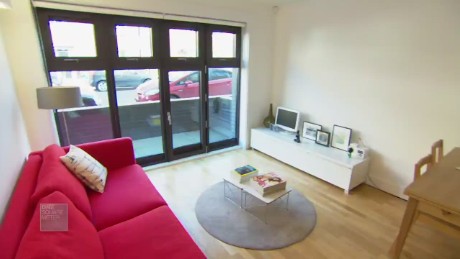These days, finding somewhere to live in London is one of the city's biggest challenges.
The Greater London Authority estimates that 49,000 new homes are required in the UK capital every year to cope with its burgeoning population.
In 2013, just under 20,000 new properties were built.
With space tight and increasingly expensive, some are predicting micro-living -- residency in compact homes and apartments strategically designed to maximize usable space -- could become a common theme in the coming years.
"There's huge housing pressure," said Lucien Smithers, sales and marketing manager at Pocket, a micro-home developer.
"The last five years have seen a real population growth in London. We've just crossed 8.6 million and by 2030 we're going to be knocking on 10 million."
According to Smithers, shaving off excess space in new-build properties can squeeze more people in while still providing all the necessary amenities of city living -- although Pocket would argue that their 38 square meter properties (409 square feet) are perfectly proportioned.
"They don't have any car parking because (people) don't have cars anymore, they have space for bicycles. There's a big living area, and you know to be honest, you don't need a bath in your bathroom ... a wet room is exactly what's required," Smithers said of the properties.
Read: Could micro homes offer housing solution
Pocket's development in London's transport zone two would sell for around $350,000, roughly 20% below market value. Special conditions ensure the properties maintain their status as affordable housing.
"All of the developments are prioritized for sale to people who live or work in the borough (local area). They have to earn under £66,000 ($100,000) and they can't already own another property," Smithers explained
Demand is far from in short supply. "We currently have over 15,000 people registered for it, the demand is unbelievable," Smithers said.
First-time buyers
Yet even with these conditions, owning a home is still out of reach for many Londoners.
This is a fact recognized by Reza Merchant, CEO of The Collective, another London micro home developer.
"We're now in a position where most people in their first or second jobs, in their early to late twenties can't even afford to rent a studio flat or one-bedroom flat," Merchant said.
The Collective's Camden development is an upmarket hostel-style set up which is aimed at young professionals featuring small bedrooms, and shared communal spaces. Individual properties range from nine square meters rising to 20 square meters (97 sq ft to 215 sq ft).
"Our prices here start at about £200 ($304) a week," Merchant explained. "That's all inclusive of all your utility bills, so your gas, your electricity, your council tax and then also the services ... the weekly linen change, the room cleaning, the concierge; it's an all-inclusive rent.
"People are happy to take smaller bedrooms as almost like crash pads," he added.
Resident Bianca Pollio pays $425 dollars a week for 14 square meters (150 sq ft) and finds it suits her needs.
"When you live in a city and you're a student or a professional, you don't want to carry many things with you anyway. You want to be quite light," she said.
Turning heads
The likes of Pocket and The Collective have caught the attention of businesses who are keen to keep their workers in the city.
Pocket is popular with local authorities for providing living space for workers near to council offices while the Collective is in talks with KPMG to house its graduate workers.
And despite the smaller spaces, neither skimps on the facilities. The Collective has a new 10,000 sq ft project in the works in London's Wilesden Junction area that will include common facilities like spas, libraries, secret garden rooms, discos, laundrettes and private dining rooms which people can hire out when they have dinner parties.
"I think it is a new, more permanent approach to living, especially in city centers, because there's only a finite amount of space so people can't build more." Merchant said.
While the next few years will reveal how successful a concept micro-homes will become, it's safe to say they've given many Londoners an interesting option to consider.
(CNN)
ANN.Az
Follow us !











